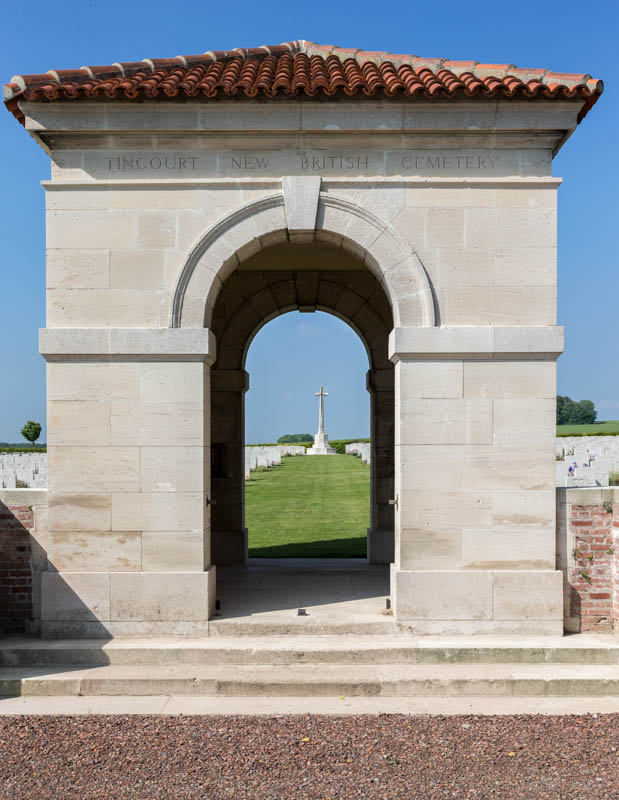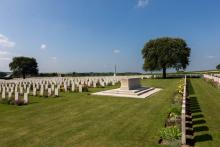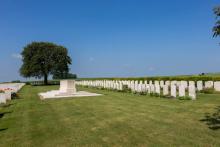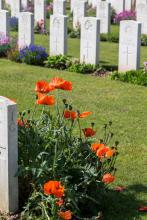Somme
Tincourt is a village about 7 kilometres east of Peronne and Tincourt New British Cemetery is on the west side of the village, just off the D199.
The villages of Tincourt and Boucly were occupied by British troops in March 1917, during the German Retreat to the Hindenburg Line From the following May until March 1918, Tincourt became a centre for Casualty Clearing Stations. On the 23rd March 1918, the villages were evacuated and they were recovered, in a ruined condition, about the 6th September. From that month to December 1918, Casualty Clearing Stations were again posted to Tincourt. The cemetery was begun in June 1917, and used until September 1919; the few German burials, during their occupation of the village, are in Plot VI, Row A. After the Armistice it was used for the reburial of soldiers found on the battlefield, or buried in small French or German cemeteries. The following were among the graveyards from which British graves were concentrated to Tincourt New British Cemetery:- BARLEUX FRENCH MILITARY CEMETERY No.2, between Barleux and Belloy-en-Santerre, containing the graves of two soldiers of the 1st Loyal North Lancs who fell in February 1917. BERNES CHURCHYARD (near Roisel, in the Somme), which contained the graves of 18 soldiers from the United Kingdom, one Canadian, and 38 German. HOWITZER WOOD CEMETERY, CLERY-SUR-SOMME, a French cemetery in the Bois des Ourages, containing the graves of three soldiers from the United Kingdom and one from Australia. JEANCOURT INDIAN CEMETERY (close to Jeancourt Communal Cemetery), in which 15 Indian cavalrymen were buried in 1917 and to which 541 German graves were concentrated after the Armistice. LE MESNIL CHURCHYARD GERMAN EXTENSION (at Le Mesnil-Bruntel), which contained the graves of ten soldiers from the United Kingdom and 150 German soldiers. LE VERGUIER GERMAN CEMETERY, near the Church, containing 292 German graves and those of five soldiers from the United Kingdom who fell in April 1918. LONGAVESNES BRITISH CEMETERY, on the West side of that village, containing the graves of 19 soldiers from the United Kingdom and three American soldiers, who fell in September and October 1918. MAGNY-LA-FOSSE CHURCHYARD EXTENSION, made by an Advanced Dressing Station in October 1918, and containing the graves of seven soldiers from the United Kingdom and one from Australia and three men of the Chinese Labour Corps. MANANCOURT CHURCHYARD, which was closed to civil burials in 1865 but was used by both sides during the War. It contained the graves of ten soldiers from the United Kingdom and one from South Africa. MARQUAIX GERMAN CEMETERY, on the North side of that village, containing the graves of ten soldiers from the United Kingdom, one French and 338 German. PERONNE COMMUNAL CEMETERY GERMAN EXTENSION, containing the graves of 25 British and 824 German soldiers. RAMICOURT COMMUNAL CEMETERY EXTENSION, made by the Germans and taken over in October 1918, by the British. It contained the graves of ten soldiers from Australia and one from the United Kingdom. SUZANNE FRENCH MILITARY CEMETERY No.1, near the Chateau of Suzanne, containing the graves of one soldier from the United Kingdom, one from Australia, 255 French and one German. TINCOURT GERMAN CEMETERY, near the German hospitals to the South-West of the village. It was used in the summer of 1918, and it contained the graves of 13 soldiers from the United Kingdom, three from Canada and one from Australia. VRAIGNES CHURCHYARD, in which three soldiers from the United Kingdom were buried by the enemy in March and April 1918. VRAIGNES COMMUNAL CEMETERY GERMAN EXTENSION, in which one British and 117 German soldiers were buried. The graves of 136 American soldiers, buried here in the autumn of 1918, and one who died in December 1917, and those of two Italian soldiers, have been removed to other cemeteries. There are now nearly 2,000, 1914-18 war casualties commemorated in this site. Of these, over 250 are unidentified and special memorials are erected to seven soldiers from the United Kingdom and one from Australia, known or believed to be buried among them. Other special memorials record the names of 21 soldiers from the United Kingdom, two from Canada, one from Australia and one from South Africa, buried in other cemeteries, whose graves were destroyed by shell fire. There are 151 German burials here, 7 being unidentified. The cemetery covers an area of 6,149 square metres.





Add new comment